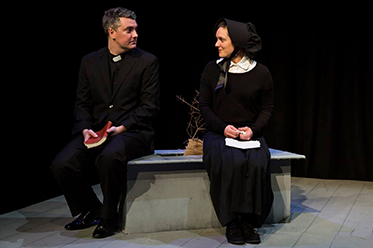 Premiering in 2004, Doubt: A Parable by New Yorker John Patrick Shanley won awards including the 2005 Pulitzer Prize for Drama and 2005 Tony Award for Best Play. It was subsequently adapted into the 2008 film directed by Shanley and starring Merryl Streep and Philip Seymour Hoffman.
Premiering in 2004, Doubt: A Parable by New Yorker John Patrick Shanley won awards including the 2005 Pulitzer Prize for Drama and 2005 Tony Award for Best Play. It was subsequently adapted into the 2008 film directed by Shanley and starring Merryl Streep and Philip Seymour Hoffman.
The setting is 1964 in a Catholic elementary school in the Bronx of New York. Nuns from the adjacent convent perform most of the teaching, with some by the newly arrived parish priest. This is Father Flynn, a man with a penchant for using parables in his sermons. He’s also in a position where his actions receive little scrutiny, at least from the other clergy. Doubt: A Parable ponders the possible consequences of such a position without accountability.
Father Flynn tells us that he uses parables in his sermons because “What actually happens in life is beyond interpretation. The truth makes for a bad sermon. It tends to be confusing and have no clear conclusion.” Following this, the play’s title seems to pair two incompatible concepts. I found that the choices made push this production much more towards being a parable. This aside, the company delivered quality performances in a thought-provoking performance.
The play opens with a quite inexperienced junior nun Sister James (Krista Thomson) visiting Sister Aloysius (Penny Larkins) in her office. The pair discuss the senior nun’s concerns over the attentions Father Flynn (Daniel Humphris) has paid to Donald Muller, the only ‘coloured’ child in the school. We learn how Sister Aloysius can only speak to the Monsignor about her concerns, but she is sure he wouldn’t believe her. Bound by protocol, she’s unable to go higher up to address the bishop. Sister Aloysius needs to exact a confession from Father Flynn, and needs the nervous Sister James to witness this.
This exposition, and the establishment of the characters and philosophies of the two nuns, is expertly achieved by both Thomson and Larkins. However, I was distracted by the excessive and seemingly purposeless movement around the stage that Larkins was allowed. This seemed contradictory to the impression of thoughtful intent formed by her words.
Fortunately, more appropriate restraint is applied by director Stephen Wheat for much of the rest of the play. Humphris succeeds in presenting Father Flynn as having concern for – and wanting to be part of – the community, in contrast to Sister Aloysius’ aloofness and austerity. For at least some of the time, we could think that Sister Aloysius doesn’t have solid grounds for her cynicism as she seeks to catch out the priest.
However, there are some tell-tale hints. The most suggestive is Flynn’s annoyance at Sister Aloysisus’ speaking to nuns from his former parish, thereby going around the boys club of the cloth. The vigour of his protest over a mere matter of procedure strikes as particularly incriminating for someone who has nothing to hide. This substantially lessened my limited uncertainty over whether the accusations against him were substantive.
We can have distance from an upsetting idea if we do not know anyone directly affected. To lessen this distance, we are given insight into a potential victim’s life through Donald’s mother, Mrs Muller (Tariro Mavondo). As she describes the bargain she’s prepared to make so that Donald can graduate, we believe her pragmatic acceptance of circumstances, as part of a group that has been failed by both secular and religious institutions. It is this that takes the play from a contest of ideology to something unexpectedly shocking.
Despite the title, it is still odd to feel that one has been watching a parable. A moral lesson comes across clearly; within an institution (see patriarchy) there’s a chain of command, and it doesn’t pay to attempt to subvert that, regardless of the righteousness of your concerns. However, Shanley wanted us to watch the play and be in a state of doubt over Father Flynn’s guilt or innocence.
I suspect that part of the difficulty with presenting this play – only from 2004 – in 2015, is that the world has changed a lot in a short time. A search of Newspaper Source Plus for articles containing the terms ‘priest sexual abuse’ returned 73 hits for the period 1995-1999, and 3586 for the period from 2010-2014. Nowadays, the failings of institutions are made much more public than previously. This, the certainty of Aloysisus in her cause, and the lack of any effective foil for her surety, made it too easy to think the worst of Father Flynn. This made me feel that the production was unable to sustain the doubt Shanley intended.
Discussions after the show are sure to be an interesting complement to the theatrical experience. Any work that forces us to consider our attitudes to institutions that were once so privileged that they were trusted implicitly must be a good thing. So, whatever qualms I may have about the production, overall it is a success. Also, it should stimulate the curious into getting their hands on the script, and reading its preface to gain insight into Shanley’s intentions.
Director: Stephen Wheat Cast: Daniel Humphris, Penny Larkins, Daniel Humphris, Tariro Mavondo and Krista Thomson Costume Designer: Kim Bishop
Doubt: A Parable
The Loft – Chapel Off Chapel, 12 Little Chapel Street, Prahran
Season continues to 22 August 2015
Bookings: (03) 8290 7000 or online at: www.chapeloffchapel.com.au
For more information, visit: www.rlproductions.com.au for details.
Image: Daniel Humphris and Krista Thomson in Doubt – photo by Simon Fitzpatrick
Review: Jason Whyte
